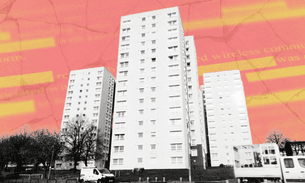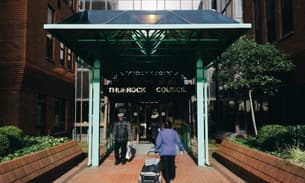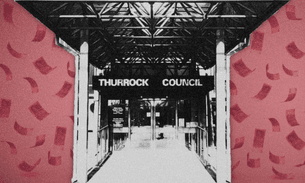
‘Where’s the justice?’: local anger at Thurrock's ruinous deals
Local residents have demanded that authorities take action over the disastrous investment strategy that left an Essex council effectively bankrupt. Revelations by TBIJ this week shed new light on the collapsed deals that left Thurrock council with a budget gap of nearly £500m.
Thurrock was potentially cheated out of as much as £130m by Liam Kavanagh, a rogue businessman who spent the council’s money on a private jet, diamond-encrusted jewellery and a fleet of supercars.
Kavanagh and his companies – which received £655m in loans from Thurrock between 2016 and 2020 – had inflated the value of a group of solar farms the council was investing in. Thurrock’s chief finance officer, Sean Clark, failed to check the information was accurate and approved one £40m payment despite having received legal advice warning him of the risks involved.
“Where is the justice?” asked Angela Cockcroft, a local resident. “Why has no one been arrested for embezzling our money? Why did Thurrock council leave one man in charge of large amounts of money without even asking questions until it was too late?
“We are lucky if our bins are emptied at the moment on our road, and my council tax is £2,000 a year.”
Clive Betts MP, chair of the Levelling Up, Housing and Communities Committee, voiced similar concerns. “Aside from the questions of legality about the issue, to have a council spend so much money in a way that seems uncontrolled is really alarming and unacceptable,” he told TBIJ. “Questions remain unanswered about the council’s internal and external auditors and how the department’s early warning systems failed to identify this.”
The deals with Kavanagh were part of a wider investment strategy, overseen by Clark, that saw Thurrock borrow £1bn from other local authorities which was then poured into a series of ruinous business ventures. It has left Thurrock with a budget gap of almost £500m: the second biggest ever reported by a UK authority.
“The borrow-to-invest strategy was an emperor with no clothes,” said Tory MP for Thurrock Jackie Doyle-Price, whose partner is former council leader Mark Coxshall. “The naivety and arrogance with which this strategy was embraced created the conditions for it to be exploited for profit.
“Investments were made in some companies without any knowledge or consent by members. This is a council that had become dysfunctional and its officers unaccountable.”
Thurrock went on to try and hide its losses in what a government-commissioned inspection described as a “dereliction of leadership”. The council has since been declared effectively bankrupt, with its residents set to bear the brunt of the damage for years to come.
Steve Liddiard, a Labour councillor for Thurrock, said: “I think substantial cuts will affect those families on low incomes and increase child poverty. In conjunction with inflation, rise in rents and interest rates, I foresee catastrophe for many families.”
Thurrock’s finances are now effectively under the control of Essex county council and in March, it was given special permission to impose a 10% council tax without a local referendum. Years of increases are likely to follow.
“It’s the people of Thurrock who are the victims here,” said Samantha Byrne, who is leading a campaign to protect a local theatre complex from closure. “They will have all services cut to a minimum, their assets sold, their taxes raised. They will be paying so much more for so much less … they will be faced with a debt that their grandchildren will be paying back.”
Others pointed to wider issues. Tim Minogue, editor of Private Eye's Rotten Boroughs column, said: “Thurrock council is not alone in having been driven to desperate measures in its attempts to find new sources of funding given the pressure on local authority finances. In particular, the reduction of some 40% in central government grants since 2010.
“Incompetent officers and complacent councillors made a particularly toxic combination here. But the circumstances that led to this disaster are not unique to Thurrock. It is not the first council to suffer financial meltdown and it will not be the last.”
Rob Whiteman, chief executive of the Chartered Institute of Public Finance and Accountancy, highlighted the lack of scrutiny the council’s investments were subject to. “The weakening of strong local public audit since the abolition of the Audit Commission [the independent spending watchdog dissolved in 2015] is a root cause of less local transparency and challenge,” he said, “and needs urgent attention to restore strong and effective external audit.”
Kavanagh strongly denies the allegation of fraud and says that there were no restrictions on how he used capital invested by Thurrock. He asserted that valuations go up and down and the higher valuation provided to Thurrock was “an accurate representation of the future of the assets”. In a statement, he said: “I was approached by Thurrock council in relation to investments in solar farms and those investments produced significant income for Thurrock council over a number of years and the assets continue to make a profit; even more so with recent rises in energy prices.
“I have never misled Thurrock council during the course of those investments. It was always my understanding that Thurrock council conducted its own independent due diligence into investments. I have had a successful career over the course of decades, preceding and outside of renewable energy, and separate to any of the Thurrock council investments.”
The newly elected council leader, Andrew Jefferies, told TBIJ: “As a council we recognise that things went very wrong and our focus is on taking the necessary action to put that right.
“I am deeply sorry for the shocking and unacceptable failings of the past. We are taking all appropriate action to recover the council’s financial position while ensuring that we protect vulnerable residents and essential services.”
Header illustration by Eleanor Shakespeare
Reporter: Lucy Nash
Editor: Franz Wild
Fact checker: Alex Hess
Our reporting on local power is part of our Bureau Local project, which has many funders. None of our funders have any influence over our editorial decisions or output.
-
Area:
-
Subject:




